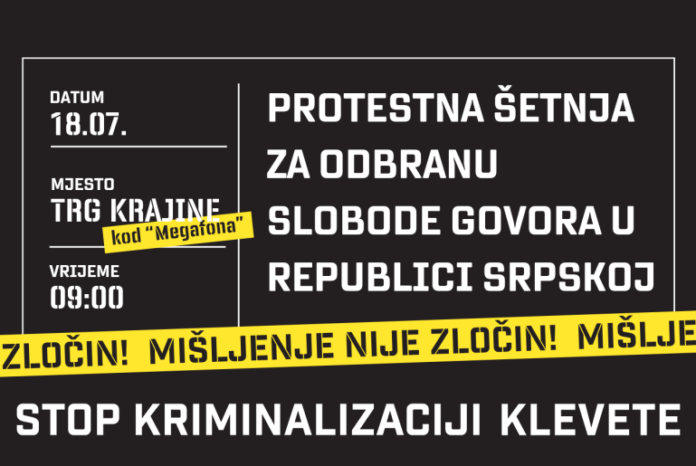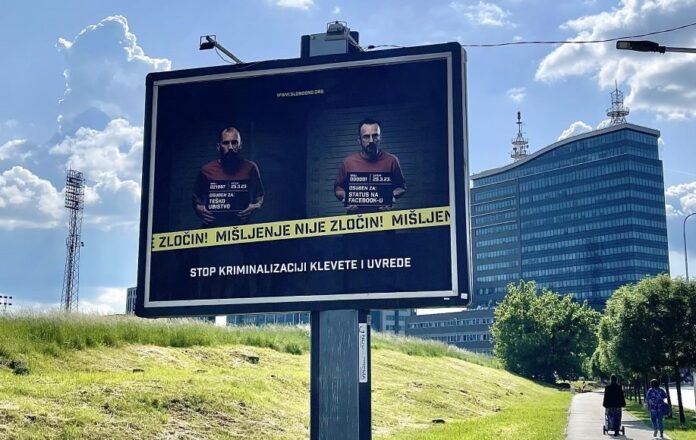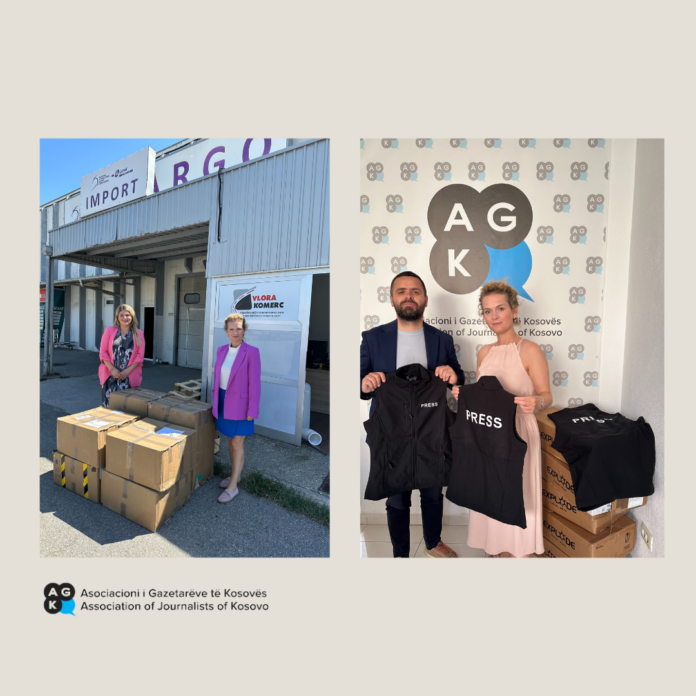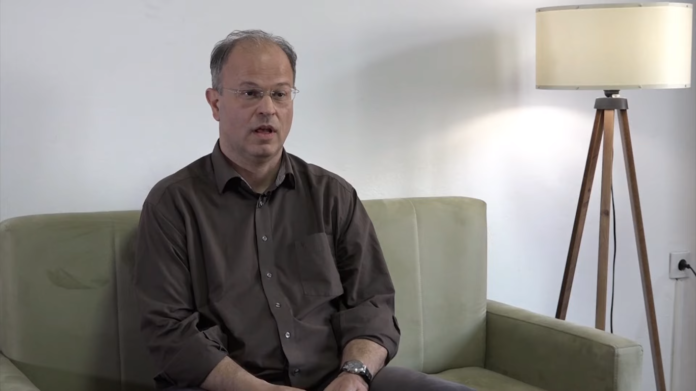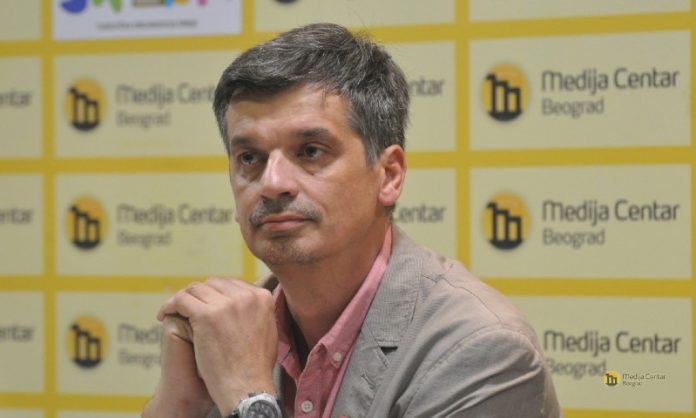EESC info: Tell us about the incident which led to your arrest and imprisonment
Boško Savković: On 4 June 2023, a huge demonstration was organised in Belgrade following two massacres which saw 18 people killed, half of them children. People believe that it was a political demonstration. On the contrary, it was a peaceful demonstration and one of the biggest. People were asking for the minister in charge of the police and the members of the Electronic Media Regulatory Authority to be replaced.
I was carrying a banner, which on one side said “PINK STINK” (PINK is the biggest progovernment media group in Serbia) and on the other “Vultures and hyenas walk together for a safe Serbia”, a hint to the motto “vultures and hyenas for safety” used by some government members in Parliament. Someone came and tied a puppet to the banner that looked like a hung Mr Vučić. The puppet was soon taken down but photos had already been shared on social media and were going viral.
Although I was not in the pictures, I was accused of this act and charged with attempting to subvert the constitutional order in Serbia, which carries some 30 years in jail. Four policemen came to arrest me. “Why four?”, I asked. “Two for you and two for the puppet”, they said. But they found neither the banner, which had been left in my friend’s car, nor the puppet.
Your detention mobilised a great number of people in Serbia and Brussels. As you are the co-chair of the EESC’s EU-Serbia Joint Consultative Committee , the EESC sent out a tweet demanding your immediate release which reached 27k views. How do you feel about that?
I was in jail, I didn’t have any idea what was happening. The only thing I know is that my wife called the EESC Vice-President, Mr Plosceanu, and the EESC responded immediately, and so did the media, civil society and NGOs in my country. People know me in Serbia and they all reacted, organising demonstrations outside the Palace of Justice. But at that time, I was unaware of all this. When I was given 30 days in prison, I started thinking about all the things that could happen to me and the years I would spend in jail. You can’t think clearly in these moments, even though I tried to use my background as a lawyer to think rationally.
I think people understood that I was not guilty, through the pressure from the EU institutions, from NGOs, from people, so they talked to the Serbian authorities and the result was a plea bargain to be signed with the prosecution in exchange for a conditional sentence of six months, with a general admission of guilt on my part.
I am no Che Guevara, I am just one of the citizens protesting in the street, asking for a safe country. Nothing else. I am a writer, a journalist and a film maker. But we are in a situation where members of the government speak against actors, media people, journalists and citizens, and people have taken to the streets because they don’t want to listen to this hate speech in Parliament anymore.
Do you think that this incident could have an impact on Serbian society?
It could, but we need free and independent media. There are only a few independent media outlets in Belgrade. Outside the capital, in smaller towns and cities, people don’t know what is going on. This is an information war and a war against fake news from the government, who present a totally distorted image of the demonstrations and people’s demands.
Do you think this event will leave a lasting mark on you?
I want to leave this incident behind me because jail is no place for decent people. I don’t want to fear because one moment of fear can take away ten moments of your life. But fear is an instinct we all share. I am not a revolutionary, I am just a man who wants to have the right to speak up. Do I ask for too much? These are just some of the basic values of the European Union: free justice, free speech and the right to think for oneself.
What kind of support do you expect from the Committee and the EU?
Even simply following the situation in Serbia and monitoring the developments every day is good enough. It is also important for the EU institutions to follow the media and the news coming from Serbia. Support at any level is really useful for us. For example, two journalists are in jail right now, so sending political and diplomatic messages to our government would help. My idea is Europe, a European way for Serbia.
Can you tell us a bit more about the situation of the media in Serbia?
We have some independent media, but they are not enough and don’t reach the whole country. I also think that we don’t have enough media to promote the EU, and that is why the idea of Europe is not popular in Serbia. Archimedes, the Greek philosopher, once said “Give me a place to stand and I will move the world”. I will say: “Give me media for two months and I will change the country”. There is no doubt that a Serbia with free media would bring about change. We now have some groups for the protection of journalists, but we don’t need to protect journalists as if they were endangered animals.
And what about the new generation of journalists?
They are doing their job with great passion and dedication. They just believe that impartial information and non-partisan news are good for a country and for society. I know that they turn down job offers from TV channels that pay well, where all they would have to do is toe the line. But there are some things that money cannot buy, like dignity. This young generation has dignity. They are trying to build a professional career in a way that when they wake up in the morning they can look at themselves in the mirror with no shame.
How do you see the future of Serbia?
Serbia’s future is in the EU. My daughter is 23. I am sure that one day she will be living in the European Union, but I don’t feel the same for myself. I don’t know how long it will take for Serbia to meet EU standards or if the EU will set new standards for Serbia. But I think that there is only one road for Serbia to take.
I was at a conference in Thessaloniki 20 years ago where participants said that they needed Serbia in the EU because Serbia is the only land that can connect the Western Balkans to the EU. And it is true, because you can travel by ship, by train, by airplane and now there is a connection via Bulgaria and Romania. So, the destiny of the Western Balkans is inextricably tied to the destiny of Serbia. Somehow, no other country in the region could be a part of the EU on its own.


